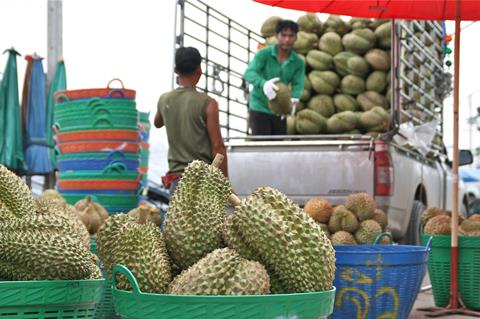Cambodia’s ban on Thai fruit and vegetable imports causes oversupply on domestic market, with tropical fruit suppliers bearing brunt of impact

Thailand’s fresh produce trade is feeling the effects of Cambodia’s ban on Thai fruit and vegetable imports, which was imposed on 17 June, according to leading industry sources.
The timing of the ban is particularly difficult for Thailand’s domestic fruit producers as they are in peak season for tropical fruits, and cross-border trade into Cambodia is a key sales outlet.
“The ban has created considerable pressure in Thailand’s domestic market,” Ritu Ahluwalia, head of imports and business relationship manager for major distributor Flora Capital, told Fruitnet.
“According to the Department of Foreign Trade, Thai-Cambodian border trade in 2024 reached Bt175.53 bn, with exports totalling Bt141.85 bn.
“While specific fruit percentages aren’t publicly available, the closure comes at a particularly challenging time as Thailand is experiencing a strong harvest season for tropical fruits like durian, longan, and rambutan.”
In addition to its own direct consumption of Thai tropical fruits, Cambodia is a key distribution hub for reaching other regional markets, according to industry sources.
Farmers who were counting on both domestic and cross-border sales are now reportedly dealing with oversupply in the domestic market. Some traders are reporting difficulty moving inventory, which is resulting in price pressure on the market.
One leading Thai fruit importer/distributor, speaking on condition of anonymity, told Fruitnet the ban was also impacting sales of imported fruits to Thailand. A certain percentage of imported fruits, including premium products, typically flows into Cambodia.
“The ban is indeed affecting the market,” said the importer. “I don’t know the exact figures on what volume of imported fruits goes into Cambodia but it’s quite significant as I can see how sales have slowed down both for imported and domestic fruits.
“In the wholesale market, we’ve seen a big drop in sales – almost by 50 per cent, but the retail programmes are still going smoothly. It seems like there’s no real impact there.”
For Thailand’s domestic producers, the impact of the ban, and the associated political tensions, extend beyond sales to affect their operations in terms of labour supply too.
“Cambodian workers make up more than 80 per cent of the agricultural labour force in provinces like Chanthaburi, handling fruit collection, sorting, and packaging. With both export routes blocked and labour concerns, the impact on fruit farmers and traders has been quite significant,” said Ahluwalia.
Some Cambodian workers have reportedly begun to return home due to the political uncertainty, creating operational challenges at a time when farms are most in need of support with harvesting and processing.
Cambodia’s temporary ban on Thai fruit and vegetables followed a border dispute between the two countries in late May. It is one of a series of retaliatory actions imposed by Cambodia after Thailand placed restrictions on border crossings and operating hours, and a military clash in the disputed area.
Thai Prime Minister Paetongtarn Shinawatra faces growing dissatisfaction domestically over her handling of the border dispute, which flared after a Cambodian soldier was killed during a brief exchange of fire.
Thousands of protestors rallied in the Thai capital, Bangkok, on Saturday to demand her resignation. The political turmoil was set off by a leaked phone call with former Cambodia Prime Minister Hun Sen. In the call over the border dispute, she addressed Hun Sen as “uncle” and criticised a senior Thai military commander handling the dispute. The call has sparked public anger, with Thai nationalists accusing her of kowtowing to Hun Sen. Paetongtarn apologised and defended the call as a “negotiation technique”.
While Cambodia’s ban on Thai fruit imports appears to be a temporary political move rather than trade-focused, industry sources said the economic impact was very real for the agriculture sector – and it was difficult to gauge how long it would go on for.
“Everyone’s hoping for a quick resolution, but given the nature of the border dispute, it’s hard to predict timing,” said one source.



